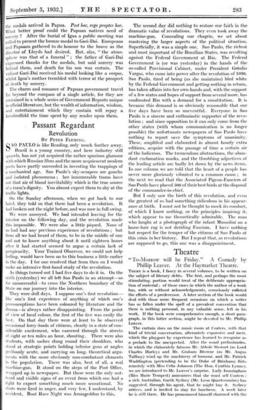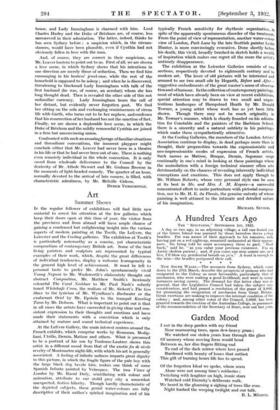Theatre
" To-Morrow will be Friday." A Comedy by Phillip Leaver. At the Haymarket Theatre. THERE is a book, I fancy in several volumes, to be written on the subject of literary debts. The first, and perhaps the most stimulating, portion would treat of the deliberate appropria- tion of material ; of those eases in which the author of a work has, with or without acknowledgments, consciously enlisted the efforts of a predecessor. A later section of the book would deal with those more frequent occasions on which a writer has so fallen under the spell of a prevalent convention that there is nothing personal, in any valuable sense, left in his work. If the book were comprehensive enough, a short para- graph, in this latter section, might be devoted to Mr. Phillip Leaver.
The curtain rises on the music room at Coaters, with that kind of trivial conversation, alternately expansive and inert, which the playgoer by experience has learned to recognize as a prelude to the unexpected. After the usual preliminaries, in which the elaborately fatuous Mr. Athole Stewart (as Lord Charles Harley) and Mr. Graham Browne (as Mr. Angus Tallboy) wind up the machinery of humour, and Mr. Patrick Waddington (pretending to be the Duke of Brixham) flirts remotely with Miss Celia Johnson (The Hon. Cynthia Lynne), we are introduced to Mr. Leaver's surprise. Lady Immingham (Miss Marie Tempest) announces that she must sell Coaters a rich Australian, Garth Sydney (Mr. Leon Quartermaine) has suggested, through his agent, that he might buy it. Sydney arrives, and is invited to stay for luncheon. A week later he is still there. He has pronounced himself charmed with the
house, and Lady Immingham is charmed with him. Lord Charles Harley and the Duke of Brixham are, of course, less unreserved in their admiration. The latter, indeed, thinks he has seen Sydney before : a suspicion which, in the circum- stances, would have been plausible, even if Cynthia had not obviously fallen in love with the man.
And, of course, they are correct in their suspicions, as Mr. Leaver hastens to point out to us. First of all, we are shown a love scene, in which Sydney shows that his intentions in one direction are merely those of seduction. Then we find him rummaging in his hostess' jewel-case, while the rest of the household is supposed to be asleep ; and when he is discovered, threatening to blackmail Lady Inuningham with talk of the first husband (he was, of course, an acrobat) whom she has long thought dead. Then is revealed the other side of this not unfamiliar currency. Lady Immingham hears the call of her distant, but evidently never forgotten past. We find her sitting on the sofa and exchanging reminiscences of circus life with Garth, who turns out to be her nephew, and confesses that his resurrection of her husband has not the sanction of fact. Finally, we are shown a deplorable love scene, in which the Duke of Brixham and the mildly remorseful Cynthia are joined in a firm but unconvincing union.
Confronted with such an amazingfarrago of familiar situations and threadbare conventions, the innocent playgoer might conclude either that Mr. Leaver had never been in a theatre in his life or that he had never been out of one. There is nothing even remotely, individual in the whole concoction. It is only saved from wholesale deliverance to the Council by the dexterity of Mr. Athole Stewart and Mr. Graham Browne in the moments of light-headed comedy. The quarter of an hour, normally devoted to the arrival of late corners, is filled, with characteristic adroitness, by Mr. Melville Gideon.
DEREK VERSCROYLK,































 Previous page
Previous page